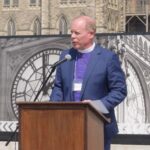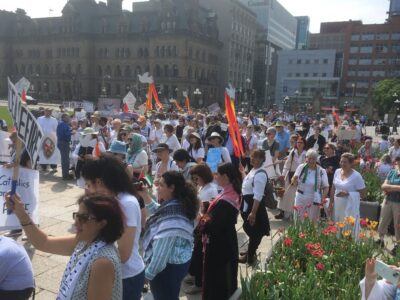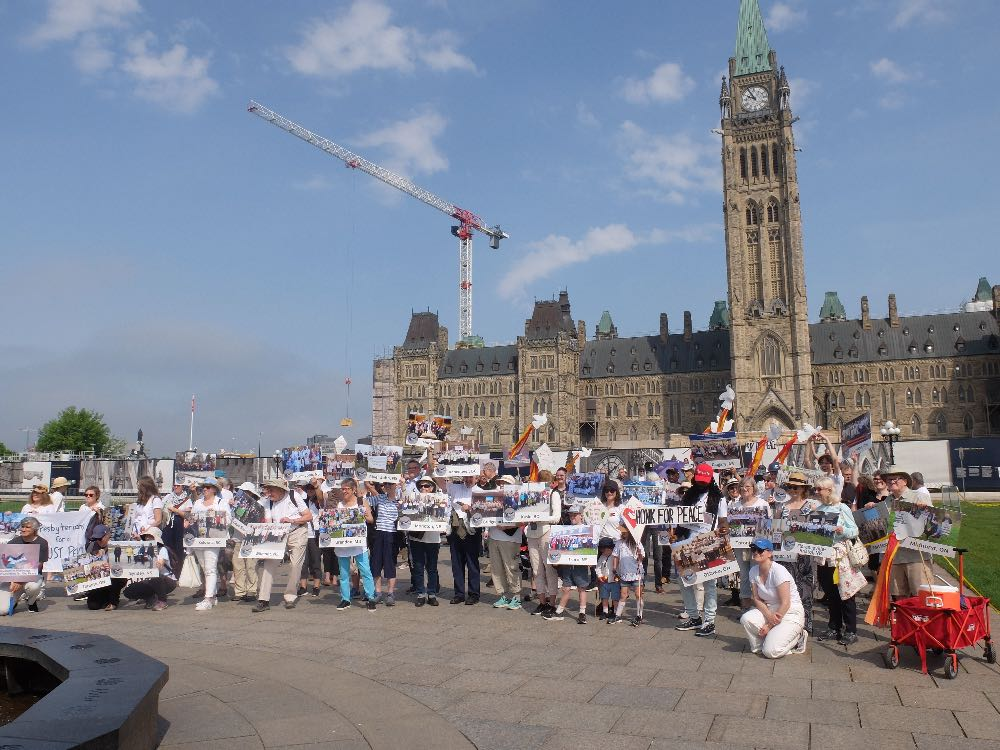Christians and church leaders from multiple denominations came together in Ottawa on May 22 to call for a ceasefire in the Israel-Hamas war and for a just peace. They took part in a pilgrimage walk and vigil at Parliament Hill led by the ecumenical social justice coalition KAIROS. Afterwards, the church leaders delivered their message at a press conference and in meetings with Members of Parliament.
In the morning, more than 150 people gathered at Minto Park where United Church minister the Rev. Theresa Burnett-Cole of Glebe-St James offered a prayer. After a land acknowledgement, those gathered were invited to follow the Indigenous participants, Palestinians and leaders from the Anglican, Lutheran, Mennonite, Antiochian Orthodox, Presbyterian and United churches as they walked up Elgin Street toward Parliament Hill.
The Gaza Ceasefire Pilgrimage is an international initiative that encourages people to walk the length of Gaza, about 41 kilometres, in prayerful solidarity with people there who are trapped in catastrophic conditions of war and famine. KAIROS staff reported that 150 Christian congregations have participated in Gaza Ceasefire Pilgrimages across Canada, collectively walking about 10,000 kilometres. Those walking to the vigil in Ottawa carried banners, kites, peace doves and photos of groups from across Canada who had participated in pilgrimages.
Vigil at Parliament Hill
When they arrived at Parliament Hill, Leah Reesor-Keller, interim executive director of KAIROS Canada, moderated the vigil.
The first speaker was Rula Odeh, chair of the board of Canadian Friends of Sabeel and a Canadian-Palestinian Christian. “Palestinian Christians have been a continuous presence in the Holy Land for over 2000 years, and we as Christians and churches cannot give up on our brothers and sisters from the cradle of Christianity,” she said. “They need us to amplify their voice in our churches and ecumenical initiatives. They need us to be there for them with bolder, stronger and faster actions.” Later in the vigil, some of her family members led the crowd in singing the hymn ’Dona Nobis Pacem,’ which Odeh explained was a favourite song of her 90-year-old Anglican father who was displaced from his home in 1948.
Bishop Andrew Asbil of the Anglican Diocese of Toronto represented the Anglican Church of Canada, reading a statement from Archbishop Linda Nicholls, who was unable to attend. ”My heart breaks with the pain of the unrelenting tragedies unfolding across the land of the Holy One as no end is yet in sight,” she wrote. “The bombardment of Gaza and the destruction of Hamas will not bring peace. The attacks on Israeli settlements will not bring peace.” She echoed what Pope Francis said in a recent meeting with Anglican archbishops. “Wars are always, always, always defeat.”

“The initial horror of the attack on Oct. 7 has been added to by the unceasing attacks on Gaza that have killed so many women and children, given licence to increased violence in the West Bank and utterly destroyed the infrastructure of Gaza. Listening to the news every morning—the rising death tool, the agony of families of hostages, the attacks on hospitals leaving little or no medical aid, the deaths of humanitarian workers, and the inability to find ways to bring humanitarian aid to those most in need leaves us in a permanent state of keening lament at human evil.”
Perhaps looking ahead to the church leaders’ meetings with government officials later that day, she added, “We must demand more from our government to do what it can to add its voice to that of international bodies for justice and peace, and to use its economic and political influence wherever possible. To do nothing is to be complicit.”
Thanking all who gathered that day, she concluded her letter: “The Anglican Church of Canada stands with all who are seeking an end to the violence, a permanent ceasefire, immediate provision of humanitarian aid, an end to all exports of arms to Israel and intermediaries, the release of all hostages, and a return to discussions that will lead to justice, recognizing the continuing need to address the illegal occupation of Palestinian lands and the need for peace that will lead to the thriving all who live in Israel, Gaza, and the West Bank.”
The Rev. Ian Ross-McDonald, general secretary of the Presbyterian Church’s Life and Mission Agency, had just returned with United Church clergy from a week of meetings with Palestinian Christians, church leaders, NGOs, United Nations agencies in the occupied territories of Palestine. “The people we met desperately want peace, and they look for ways that Palestinians and Israelis can live together in the land,” he said.
“Palestinians also told us that they feel abandoned,” he said. “After 76 years of isolation, hardship and betrayal, and the incremental loss of culture, communities, and lives, now we are witnessing the wholesale destruction, not just of the infrastructure, but of the population of Gaza, by trauma, transfer out of the area, and killing. Indiscriminate bombing, no warnings given to civilians before attacks, food and other aid is blocked from entering the area, and people are constantly forced to move…. Repeatedly, we heard that Palestinians described the ways that they are being treated as dehumanized.”
And he relayed their difficult questions. “’Where is the Church? Where is the Church’s courage and integrity?’ they asked, “Why is there little more than silence from so many of the Church’s pulpits and public platforms?”
Ross-McDonald said the people they met repeatedly asked the Church to name honestly and accurately the unvarnished reality of what is happening in Gaza and the West Bank. “Naming things as they are is difficult and uncomfortable work for the Church, but people of faith have the resources, they have the moral responsibility, and the holy vocation to do exactly that. … Palestinian Christians would have the church engage in risky truth-telling, meaningful advocacy, and prophetic action and decisions. Or as the words in the Lutheran Church at Bethlehem put it, they’re asking the churches to proclaim the gospel of liberation and to lift up a culture of life and of hope.”

After the vigil, those in attendance were invited back to St John the Evangelist for refreshments and to watch the livestream of the press conference at Parliament, which included Bishop Andrew Asbil; the Rev. Dr. J Dorcas Gordon, principal emerita of Knox College of the Presbyterian Church; the Rev. Susan Johnson, national bishop of the Evangelical Lutheran Church in Canada; the Rev. Douglas Klassen, executive minister of the Mennonite Church, Canada; the Rt. Rev. Dr. Carmen Lansdowne, moderator of the United Church of Canada; and Leah Reesor-Keller of KAIROS.
View from Jewish Federation of Ottawa
When contacted by Perspective, Jodi Green, spokesperson for the Jewish Federation of Ottawa, said that the Jewish community in Ottawa also wants to see an enduring peace in the Middle East. She cautioned that any calls for action need to be bilateral and anything that “leans towards Israel having to take actions that are not bilateral from the Palestinian side as well threatens the democracy and the safety and the security of Israelis.”
Green noted that any time there is conflict in the Middle East, there is a rise in antisemitism and hate crimes locally, and there has been a dramatic spike in crimes reported since October 2023. There was a bomb threat against a Jewish day school in November. As anecdotal examples of the hate experienced by individuals, Green said someone made a swastika in the snow at her home this winter, and a Grade 7 student in her synagogue’s youth group has been regularly taunted and called a Nazi Zionist at her school. People feel very unsafe and most Jewish institutions have increased security measures this year, Green said.
Advocacy efforts
Andrea Mann, director of global relations for the Anglican Church of Canada, was among the group of church leaders from the Anglican, Evangelical Lutheran, Society of Friends, Mennonite. Presbyterian and United churches who, along with staff from Kairos Canada, met with 10 MPs (Liberal, Conservative, NDP and Green), including three parliamentary secretaries and members of the Standing Committee on Foreign Affairs and International Development. Their goal was to communicate the calls from the Gaza pilgrimage directly to the parliamentarians.
She reported that there was a consensus among all those they met with that steps toward a sustained ceasefire and effective humanitarian aid are urgently needed now. There was also agreement that Canada has a role to play in working “toward just peace as a middle leader among states globally and a historic supporter of the International Court of Justice and the International Criminal Court and a defender of international law and international human rights.”
The church leaders affirmed the government’s resumption and increase of funding to UNRWA, the UN Relief and Works Agency for Palestinian Refugees.
There was an acknowledgment that the Palestinian reunification program hasn’t worked well yet and needs to be reworked if it is to be effective in helping members of Palestinian Canadians’ families come to Canada. Mann said that it is also important to note that many people in Gaza would prefer to stay in the region because they want to return to Gaza.
Church leaders also heard that the situation and experience of Palestinian Christians in Gaza, and the West Bank, and Israel are not well-known or reported in secular media, so “more information is needed about the context and needs of this very small faith minority in the midst of this situation.”
The church leaders also heard repeatedly that in the hyper-partisan situation on Parliament Hill, sustained pressure upon the government is needed to keep moving the needle. The leaders were encouraged to keep up their efforts and to remind people in their churches to go to their MPs’ offices as constituents and make their desires known for Canada’s role.







Saint Mary’s Church, Westmeath — Deanery of the Northwest